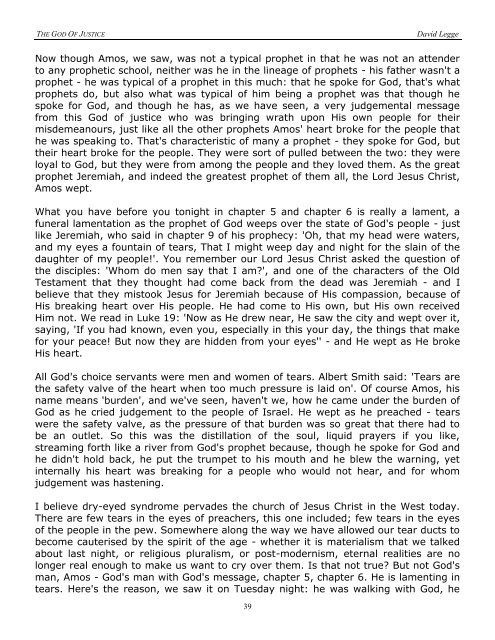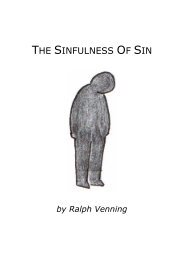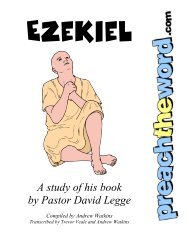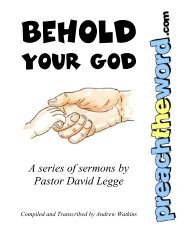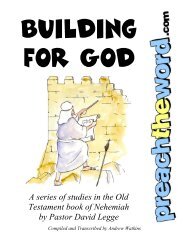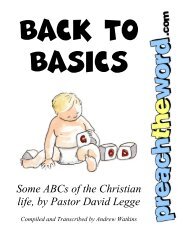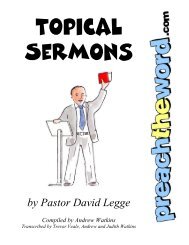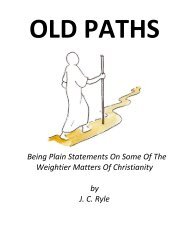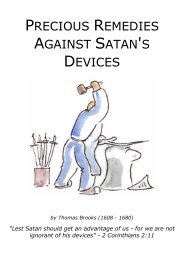Amos - The God Of Justice - Preach The Word
Amos - The God Of Justice - Preach The Word
Amos - The God Of Justice - Preach The Word
You also want an ePaper? Increase the reach of your titles
YUMPU automatically turns print PDFs into web optimized ePapers that Google loves.
THE GOD OF JUSTICE<br />
David Legge<br />
Now though <strong>Amos</strong>, we saw, was not a typical prophet in that he was not an attender<br />
to any prophetic school, neither was he in the lineage of prophets - his father wasn't a<br />
prophet - he was typical of a prophet in this much: that he spoke for <strong>God</strong>, that's what<br />
prophets do, but also what was typical of him being a prophet was that though he<br />
spoke for <strong>God</strong>, and though he has, as we have seen, a very judgemental message<br />
from this <strong>God</strong> of justice who was bringing wrath upon His own people for their<br />
misdemeanours, just like all the other prophets <strong>Amos</strong>' heart broke for the people that<br />
he was speaking to. That's characteristic of many a prophet - they spoke for <strong>God</strong>, but<br />
their heart broke for the people. <strong>The</strong>y were sort of pulled between the two: they were<br />
loyal to <strong>God</strong>, but they were from among the people and they loved them. As the great<br />
prophet Jeremiah, and indeed the greatest prophet of them all, the Lord Jesus Christ,<br />
<strong>Amos</strong> wept.<br />
What you have before you tonight in chapter 5 and chapter 6 is really a lament, a<br />
funeral lamentation as the prophet of <strong>God</strong> weeps over the state of <strong>God</strong>'s people - just<br />
like Jeremiah, who said in chapter 9 of his prophecy: 'Oh, that my head were waters,<br />
and my eyes a fountain of tears, That I might weep day and night for the slain of the<br />
daughter of my people!'. You remember our Lord Jesus Christ asked the question of<br />
the disciples: 'Whom do men say that I am?', and one of the characters of the Old<br />
Testament that they thought had come back from the dead was Jeremiah - and I<br />
believe that they mistook Jesus for Jeremiah because of His compassion, because of<br />
His breaking heart over His people. He had come to His own, but His own received<br />
Him not. We read in Luke 19: 'Now as He drew near, He saw the city and wept over it,<br />
saying, 'If you had known, even you, especially in this your day, the things that make<br />
for your peace! But now they are hidden from your eyes'' - and He wept as He broke<br />
His heart.<br />
All <strong>God</strong>'s choice servants were men and women of tears. Albert Smith said: 'Tears are<br />
the safety valve of the heart when too much pressure is laid on'. <strong>Of</strong> course <strong>Amos</strong>, his<br />
name means 'burden', and we've seen, haven't we, how he came under the burden of<br />
<strong>God</strong> as he cried judgement to the people of Israel. He wept as he preached - tears<br />
were the safety valve, as the pressure of that burden was so great that there had to<br />
be an outlet. So this was the distillation of the soul, liquid prayers if you like,<br />
streaming forth like a river from <strong>God</strong>'s prophet because, though he spoke for <strong>God</strong> and<br />
he didn't hold back, he put the trumpet to his mouth and he blew the warning, yet<br />
internally his heart was breaking for a people who would not hear, and for whom<br />
judgement was hastening.<br />
I believe dry-eyed syndrome pervades the church of Jesus Christ in the West today.<br />
<strong>The</strong>re are few tears in the eyes of preachers, this one included; few tears in the eyes<br />
of the people in the pew. Somewhere along the way we have allowed our tear ducts to<br />
become cauterised by the spirit of the age - whether it is materialism that we talked<br />
about last night, or religious pluralism, or post-modernism, eternal realities are no<br />
longer real enough to make us want to cry over them. Is that not true? But not <strong>God</strong>'s<br />
man, <strong>Amos</strong> - <strong>God</strong>'s man with <strong>God</strong>'s message, chapter 5, chapter 6. He is lamenting in<br />
tears. Here's the reason, we saw it on Tuesday night: he was walking with <strong>God</strong>, he<br />
39


